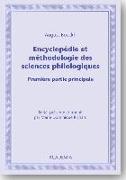| Artikelnummer | 9783896656223 |
|---|---|
| Produkttyp | Buch |
| Preis | 42,90 CHF |
| Verfügbarkeit | Lieferbar |
| Einband | Kartonierter Einband (Kt) |
| Meldetext | Libri-Titel folgt in ca. 2 Arbeitstagen |
| Autor | Boeckh, August / Richard, Marie-Dominique |
| Verlag | Academia Verlag |
| Weight | 0,0 |
| Erscheinungsjahr | 2013 |
| Seitenangabe | 309 |
| Sprache | ger |
| Anzahl der Bewertungen | 0 |
Encyclopédie et méthodologie des sciences philologiques Buchkatalog
La publication de la partie théorique de l'oeuvre d'August Boeckh, intitulé Encyclopédie et méthodologie des sciences philologiques, comble une grande lacune dans les études philologiques en France. Ainsi, cette £uvre, publiée à titre posthume en 1877 (Teubner, Leipzig)par l'un des disciples de Boeckh, E. Bratuschek, n'a absolument rien perdu de son actualit. Boeckh lui-même, le plus universaliste des philologues de son temps, considérait ses leçons sur l'Encyclopédie et la méthodologie des sciences philologiques comme 'son travail scientifique le plus personnel et le plus conséquent'. La polémique entre Gottfried Hermann et August Boeckh autour du concept et de l'objet de la philologie suite à la publication par Boeckh du Corpus inscriptionum graecarum constitue l'arrière-plan intellectuel de la genèse de l'ouvrage d'A. Boeckh qui y définit la philologie comme ' la connaissance du connu ' c'est-à-dire comme la ' reconnaissance d'un élément donné de la connaissance '. La subdivision du concept de philologie en deux parties, l'une de nature formelle, l'autre de nature matérielle, l'épuisent intégralement. La partie formelle comprend les deux moments indissociables de l'interprétation à savoir l'herméneutique ou la ' compréhension absolue ', et la critique ou la ' compréhension relative '. La définition de la philologie en tant que la ' connaissance du connu ' vaut pour les quatre types fondamentaux d'herméneutique (et de critique) que distingue Boeckh à l'instar de son maître, F. D. E. Schleiermacher : l'interprétation grammaticale et historique ' qui s'intéresse aux conditions objectives de ce qui est communiqué dans un texte ' et l'interprétation individuelle et générique ' qui étudie ses conditions de production subjectives '. La circularité de la tâche provient du fait que les quatre types d'interprétation (et de la critique) interfèrent constamment entre eux et se présupposent mutuellement. Boeckh pousse l'universalisation de l'herméneutique encore plus loin que Schleiermacher, contribuant de la sorte à l'élaboration d'une herméneutique philosophique et frayant la voie à l'historicisme. *** Publication of the theoretical part of the work of August Boeckh, entitled Encyclopedia and Methodology of the Philological Sciences, fills a gap in philological studies in France. This work, published posthumously in 1877 (Teubner, Leipzig) by one of the disciplies of Boeckh, E. Bratuschek, has lost none of its timeliness. Boeckh himself, the most brilliant disciple of de Friedrich Daniel Ernst Schleiermacher and the most universalist of the philologists of his time, considered his lessons on Encyclopedia and Methodology of the Philological Sciences to be 'his most personal and most important scientific work'. The polemic between Gottfried Hermann and August Boeckh concerning the conception and the object of philology that followed the publication by Boeckh of the Corpus inscriptionum graecarum constitutes the intellectual background to the genesis of the work of Boeckh, who defines philology there as 'the knowledge of what is known', that is, as the 'recognition of a given element of knowledge'. The subdivision of the conception of philology into two parts, one of a formal nature, the other of a material nature, resolves it completely. The formal part includes the two inseparable moments of interpretation, that is, hermeneutic or 'absolute comprehension' and critique or 'relative comprehension'. The definition of philology as 'knowledge of what is known' holds good for the four fundamental types of hermeneutic (and of critique) that Boeckh differentiates, following his master, Fr. D. E. Schleiermacher: grammatical and historical interpretation, 'which interests itself in the objective conditions of what is communicated in a text', and individual and generic interpretation, 'which studies its subjective conditions of production'. The circularity of the task derives from the fact that the four types of interpretation (and of critique) constantly interfere with one another and mutually presuppose one another. Boeckh pushes the universalization of hermeneutics even further than his master Schleiermacher, contributing in this way to the elaboration of a philosophical hermeneutic and opening the path to historicism.
42,90 CHF
Lieferbar


Dieser Artikel hat noch keine Bewertungen.